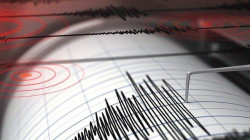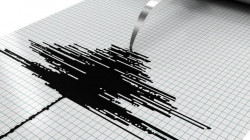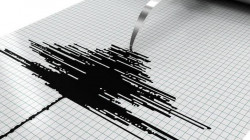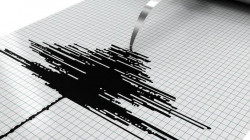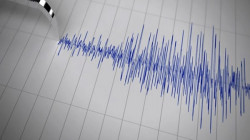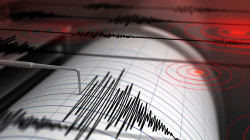Iraq's Extraordinary 2020.. Started with an earthquake and ended with a storm
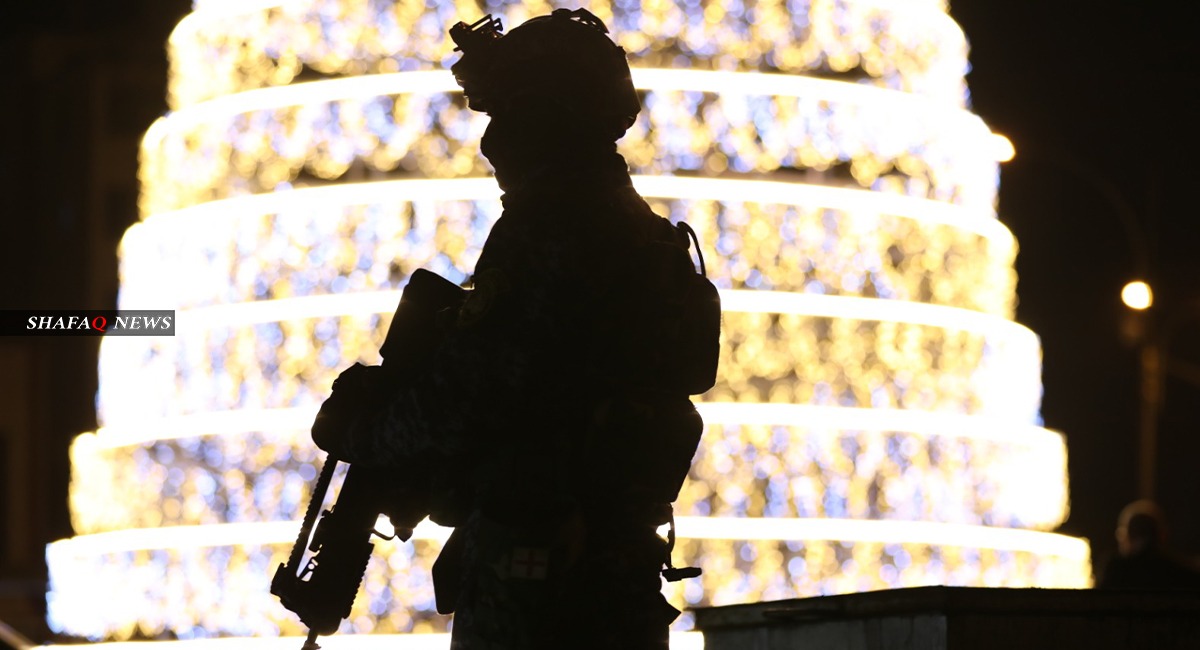
Shafaq News / Many events and developments made 2020 truly exceptional for Iraqis. It began with an assassination that raised widespread fears of a regional military confrontation – and it later passed with the election of Mustafa Al-Kadhimi as it pumped new blood into the Iraqi political life, and the optimistic news of a papal visit to Iraq soon – ending the year later with renewed fears about the regional confrontation.
It is no exaggeration to say that all the year's days have not been normal for the majority of Iraqis.. and they oscillate between security, political, economic, and even health problems as they have been chased by the COVID-19 pandemic that forced the people to retreat in fear, and limited millions of Iraqis' livelihoods.
Therefore, the Iraqis' passage between these earthquakes and their survival - as much as they can - is a source of hope and optimism, and they are supposed to enter 2021 with this feeling.
The year 2020 began in Iraq with a blatant security event, represented by General Qasem Soleimani and Abu Mahdi Al-Muhandis's assassination on January 3rd with a drone strike near Baghdad airport. With that, Iraq and the world were on the brink of a military confrontation – as it was the most likely option.
Fears flared even further five days later - and as the bodies of Qasem Soleimani and Abu Mahdi Al-Muhandis were to be buried - Iran responded, as expected, by firing long-range missiles at U.S. military bases in Iraq.
Iraq and the world anticipated with fear until U.S. President, Donald Trump, stated that the Iranian attacks did not kill any Americans, and the Pentagon announced in turn that more than 100 soldiers suffered brain concussions.
Many thought, or hoped, that the page had been turned, yet what happened was something else. Besides Tehran's assertion that the score with the Americans was not settled with shelling the bases; a new phase of the conflict was opened. The Iraqi parliament has adopted a resolution calling on the government to work to remove foreign troops from Iraq.. and while Iran has confirmed that the revenge for Soleimani and Al-Muhandis will be the removal of the U.S. forces; Shiite factions have confirmed their intention to work to expel the occupation.
Nevertheless, repeated U.S. announcements of troops withdrawals and repositions in Iraq, and some military bases' evacuation have raised hopes that fears of a full-scale confrontation will recede. Part of the problem was that the government of Adel Abdel Mahdi - in the process of conducting business by virtue of its resignation - seemed unable to fully handle the file of the U.S. military presence; but that did not prevent U.S. Secretary of State, Mike Pompeo, from calling on April 7th for a "strategic dialogue" with Baghdad, and striking a proposed date for it in June 2020.
Pompeo's call came two days before Mustafa Al-Kadhimi was appointed to form the new government.. In his call, he said the proposed dialogue would cover, "all strategic issues between our two countries, including the future presence of the U.S. forces".
So, about a month later, when Al-Kadhimi won parliamentary support for the government's formation on May 7th, he had to immediately work out the negotiations file on the future of relations with the Americans. By the June deadline for the dialogue - and then its continuance in Washington in August - the Iraqi field witnessed a new form of military harassment, with sporadic attacks targeting logistics convoys linked to the U.S. military presence and rocket attacks on the Green Zone.
The attacks seemed to be an attempt to emphasize the goal of getting Americans out of Iraq.. and though they were clearly very random, inaccurate, and did not kill Americans; they put constant pressure on two parties: Trump, who believed that the U.S. military's presence in the Middle East was worthless, and Al-Kadhimi, who was in charge of the two rounds of the "strategic dialogue" with the U.S. administration.
While Trump and Al-Kadhimi apparently hoped that their summit in Washington on August 20th would be a comfortable way out of the U.S. military presence - after the President announced his country's intention to reduce its troops in Iraq, describing the dispatch of troops there as a big mistake - but the harassment of the U.S. presence on Iraqi soil did not back down; forcing the issue to remain open by the end of 2020, while Al-Kadhimi remained vulnerable to U.S. pressure to enhance security in the country.
The case got even worse after more than 20 missiles targeted the U.S. embassy on Sunday.. Furthermore, Trump has threatened to take military action against Iran if any U.S. soldiers are killed - in conjunction with sending U.S. military reinforcements to the Gulf.
All these events in 2020 were taking place at a time when the protest movement against government and corruption continued; its developments have sometimes turned into violence that has claimed dozens of victims, with Iranian parties' headquarters being attacked. There was also a significant development when the demonstrators blocked - for the first time on January 21st - the international road linking Baghdad to Babil.
One of the most prominent events in Iraq during 2020 was the re-emergence of ISIS. The terrorist organization has succeeded in exploiting security gaps - and security laxity in general - in light of the COVİD-19 pandemic's spread, entering sensitive areas, and taking advantage of security coordination's lack between the Peshmerga forces and the federal security forces. During the first months of the year, several terrorist attacks were carried out in Diyala, Saladin, Al-Anbar, Nineveh, and Kirkuk.
The parliamentary confidence in Al-Kadhimi's government Of course – in May - was one of the most important events in Iraq during 2020; after he was nominated by Iraqi President, Barham Salih.. ending five months of political gab and raising hopes that his government would immediately try to address the deteriorating political, economic, security, and health situations.
Observers and politicians have long studied the enthusiastic U.S. position of Al-Kadhimi's government.. it was interpreted as a U.S. bet to achieve consensus on important U.S. issues - particularly the future of the U.S. military presence in the country, and the way the new government deals with the Iranian influence inside Iraq- and that raised the challenge for Al-Kadhimi at the beginning of his path to achieve harmony, balance, and independence, between Iraq's real interests, American aspirations, and the reality of the Iranian influence.
The U.S. bet was also clear because Al-Kadhimi's government, as it is known, came with the parliament's pro-Iranian political forces' support.
The speed and pace of decisions and steps taken by Al-Kadhimi in the first weeks of his term raised logical questions as to whether he was actually carrying out a quiet "white coup d'etat" to catch the joints of things and files.. including the profound changes he made in the military and security services – like his decision to return General Abdul Wahab Al-Saadi to the counter-terrorism apparatus and promote him to the post of the agency's head, following the first session of his government.
Al-Kadhimi also assigned Lt. Gen. Abdul Amir Yarallah as the army's chief of staff, and Lt. Gen. Abdul Amir Al-Zaidi as the assistant to the army chief of staff for operations; while Lt. Gen. Osman Al-Ghanimi took over as Minister of Interior, and Lt. Gen. Abdul Amir Al-Shammari was assigned the position of joint operations' commander – after Abdul Amir Yarallah headed it. Lt. Gen. Basim Al-Taa'i was assigned to the deputy chief of staff for administration affairs' post. Major General Qassim Mohammed Al-Mohammadi was also assigned to the post of the ground forces' commander.
The security situation underwent a major shift on June 25th with the announcement that a Hezbollah cell had been arrested on charges of planning an attack on the Green Zone. A difficult security test for the new government, and it has been dealt with politically.
The cell's raid came hours after Al-Kadhimi's statement drew a lot of political and media attention when he told a group of journalists, and political analysts that he, "will not allow the adventures of outside parties in Iraq.. Regional interventions in Iraq will only succeed if there is a party inside working on it".
Al-Kadhimi remained the center of news and media attention when he announced that the early elections - one of the protest movement's main demands – will occur in June 2021.
On June 20th, Kurdistan's President, Nechirvan Barzani, paid an important visit to Baghdad to clarify Erbil and Baghdad's relations - after Al-Kadhimi assumed the government's presidency. Tweeting that he had discussed with the three presidencies, "The relations between Erbil and Baghdad, and the dialogues to address problems and meet challenges at this stage".
Among the files discussed during Barzani's visit was the COVİD-19 pandemic, Iran's bombing of Kurdistan's villages, the follow-up to the severe financial crisis, and the salaries' faltering issue.
The mutual political openness between Erbil and Baghdad has produced effective military coordination - for the first time in years - between the Iraqi army and the Peshmerga forces to confront ISIS.. as it had overtaken some areas bordering Kurdistan; exploiting the lack of security and the political distance between the two capitals prior to Al-Kadhimi's government. Two days later, Kurdistan's Regional Government's Chief, Masrour Barzani, announced on June 22nd that his government was ready to radically
resolve differences with Baghdad - forming an additional dose of support for Al-Kadhimi days after his election.
On another front, Iraq was fighting the Coronavirus (COVİD-19). On February 24th, the first infection was officially reported in Najaf, while the first infection was reported in the capital, Baghdad, on February 27th. Iraqis have experienced a new challenge, with authorities declaring a curfew in several provinces and cities to contain the pandemic. However, by June, more than 20,000 infections had been reported.. and some 600,000 by the end of 2020.
Among the other important events that have marked this year are the assassinations of activists involved in the October revolution.. Nevertheless, the crime that shocked Iraqis was the assassination of media researcher Hisham Al-Hashimi in July. He was considered one of Al-Kadhimi's advisers and one of the most prominent voices against corruption, sectarianism, and terrorism.
Another event that received significant Iraqi and international attention was the trilateral summit that brought Al-Kadhimi with Egyptian President, Abdel Fattah Al-Sisi and Jordan's King, Abdullah II in Amman, Jordan, in August, shortly after Al-Kadhimi returned from his summit with Trump in Washington. Economic cooperation was the most prominent of the summit's themes, but it also sent messages rejecting foreign interference in Iraq's sovereignty.
Nechirvan Barzani returned to the spotlight with an unexpected visit to Ankara and his meeting with Turkish President, Recep Tayyip Erdogan on September 4th; shortly after French President, Emmanuel Macron's - whose relations with The Turks are strained – visit to the Iraqi capital, Baghdad, and his important meeting with Barzani there. Barzani reportedly held a retreat with Erdogan, and Turkish Intelligence chief, Hakan Vidan, was the only person witnessing the 90-minute meeting between the two men.
Also, in September, a motivational statement was issued by the Supreme Religious Authority, Ali Al-Sistani. The statement rang the bell to draw attention to the fact that Iraq is at a dangerous stage; unless Al-Kadhimi's government prioritizes combating corruption, listening to protesters, protecting Iraqi sovereignty, and early elections. Al-Kadhimi received Al-Sistani's appeal with a welcome statement confirming his commitment to the supreme religious authority's directives.
Another development was seen as a major event at the Iraqi level, represented by the announcement of the "Sinjar Agreement" in October, signed by the federal and Kurdistan regional governments' representatives. The agreement calls for normalizing the situation in Sinjar, the departure of all armed groups and militias - including the Kurdistan Workers' Party ( PKK), and the return of displaced people.
Two major security incidents also occurred in October, when dozens of the Popular Mobilization Forces' (PMF) supporters stormed the headquarters of the Kurdistan Democratic Party (KDP) in Baghdad, burning it and burning a Kurdish flag. The second crime was a massacre in the Farhatiya area of Balad district in Saladin governorate. The two crimes shook the security scene violently; at a time when Al-Kadhimi's government was trying to emphasize the security file's seriousness, as he was interested in leaving for his European tour to support economic and financial plans and to support Iraq in the face of the COVİD-19 pandemic's repercussions.
On October 26th, the Ba'ath Party announced the death of Izzat Ibrahim Al-Douri and his burial in an unknown location.. after he had been out of sight since 2003 as the second man in the former regime after Saddam Hussein. His death raised questions about the party's fate, especially in light of divisions and differences between some of its leaders.
In the weeks leading up to 2020's end, Iraq witnessed a remarkable political issue, consisting of attempts by the Iraqi front bloc, led by Osama Al-Nujaifi, to dismiss the speaker of parliament, Mohammed Al-Halbousi. Al-Halbousi survived it and made a broad political-popular movement in an apparent attempt to resolve the battle for the Sunni house's leadership.
On December 2nd, Muqtada Al-Sadr took to Twitter to call for what he called the "restoration of the Shiite house," a call that has drawn much speculation about its significance.. whether it is an attempt to assert his leadership of the Shiite forces or to re-establish an election position ahead of early elections in June 2021.
In the last two months of the year, some cities and towns in Kurdistan have witnessed demonstrations - particularly in Al-Sulaimaniyah - due to delays and interruptions in salaries. There were casualties, violence, and burning of party buildings, the government imposed a curfew, and the internet service was cut off. The salary problem was exacerbated by the faltering understandings reached with Baghdad in light of the economic repercussions of the COVİD-19 pandemic.
On December 7th, Pope Francis announced that he would visit Iraq on March 5th for a historic papal visit at a crucial moment in Iraq's history. Following years of ISIS and Al-Qaeda's terror sought against Christian minorities in Iraq and Syria. The Vatican and Iraqis hope Pope Francis' visit will be a new page of forgiveness, tolerance, and coexistence.. and confirmation of Christians' attachment to their presence in the region.
Before the end of the year, the decline in oil prices globally pushed Iraq to lower the price of its dinar against the dollar; this creates a stormy fiscal year, making Iraqis anticipate 2021 more than others.
With the smell of gunpowder rising to clashes between Iran and America, would Iraq swallow the cup of those clashes' bitterness directly?
